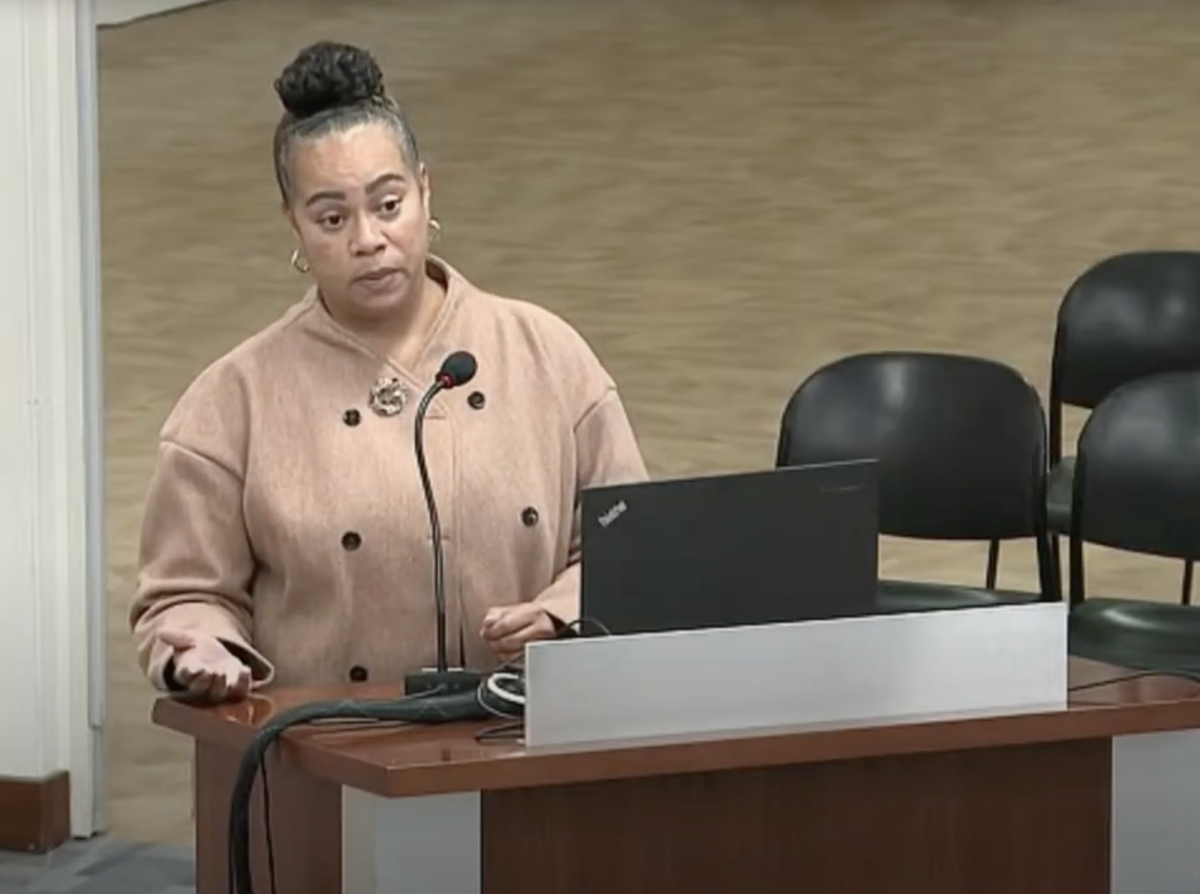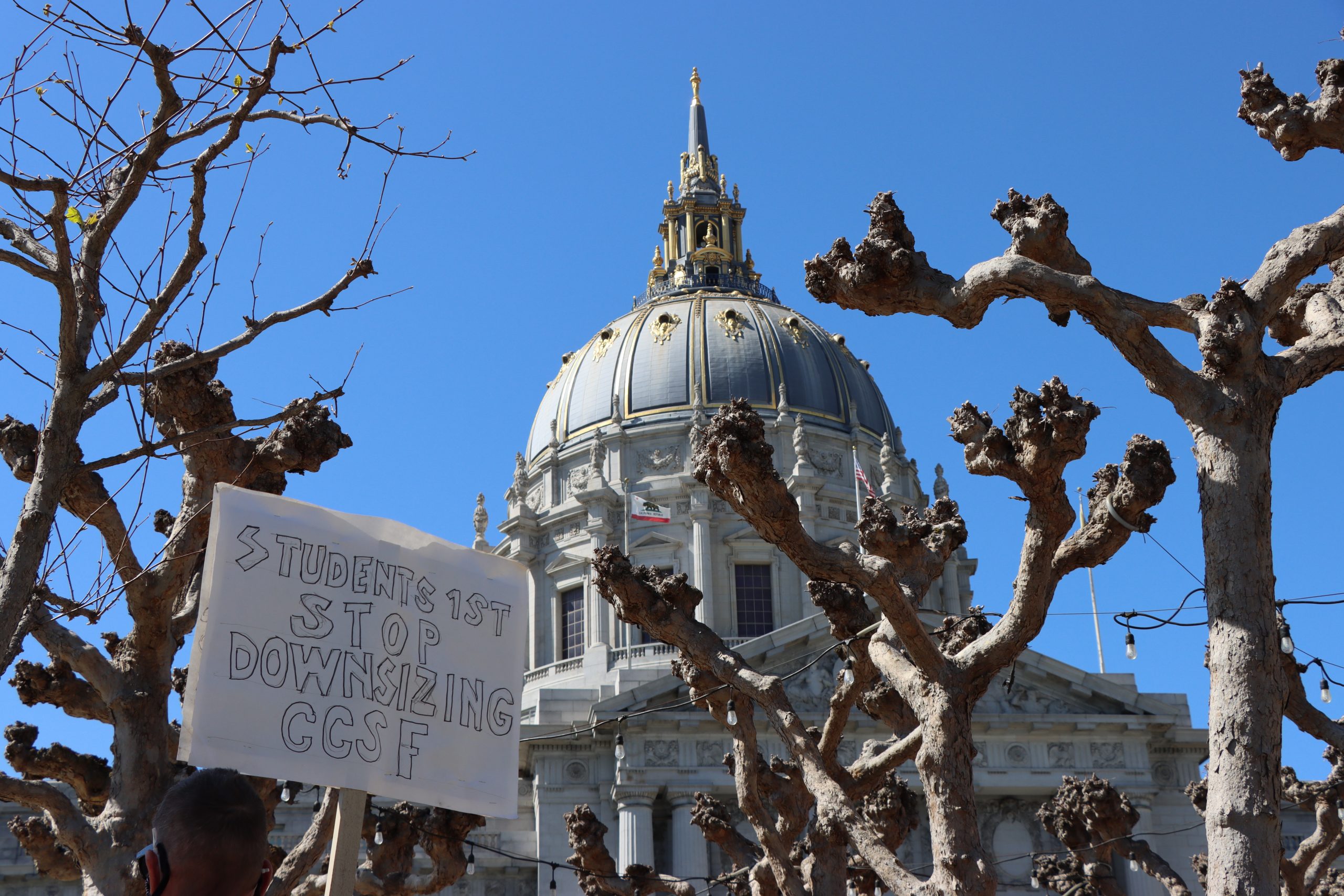
Faculty, students, staff and activists gathered at San Francisco’s Civic Center Plaza on March 12 for a direct action in response to “preliminary layoff” notices issued to 163 faculty members at City College of San Francisco.
Attendees took turns leveling their concerns over a loudspeaker to the crowd of about 150 people, with the ash-gilded dome of City Hall behind them.
State law requires advance notice be given to educators before being fired outright. Commonly known as “pink slips,” these notices presumably allow for a degree of response or even a chance to appeal the decision. The recent pink slips were greenlit by the CCSF Board of Trustees at a February 25 meeting, following a public comment section in which faculty, students and parents decried the soon-to-be-approved cuts.

Dr. Lily Ann Villaraza, a full-time tenured faculty member in the Philipine studies department, was among those speaking out against the recent pink slips. Villaraza sits on the curriculum committee and the student equity strategies committee and was among those who received a layoff notice.
“Are you taxing the people who are left, or do some of these decisions just start becoming administrative?” Dr. Villaraza posed.
One concern of many is that the sphere of responsibilities that have always fallen under faculty committees will slide into administrative hands, a possibility opposed by the most vocal students and faculty at Friday’s demonstration.
Faculty expressed vivid frustration with the trustees’ 5-2 decision to issue the pink slips, but were not surprised it has come to this. Greg Keech, an English as a second language faculty member who didn’t receive a pink slip, sees the almost certain layoffs as connected to the college’s struggle with accreditation and subsequent state takeover.
“We never recovered from that,” Keech said.
CCSF underwent a state takeover between 2012 and 2017, and a special trustee with extraordinary powers (STWEP), Robert Agrella, was given decision making power at the college. State Chancellor Eloy Ortiz Oakley has brought up the idea of assigning a special trustee to the Peralta Community College District, citing finance and “governance” issues.
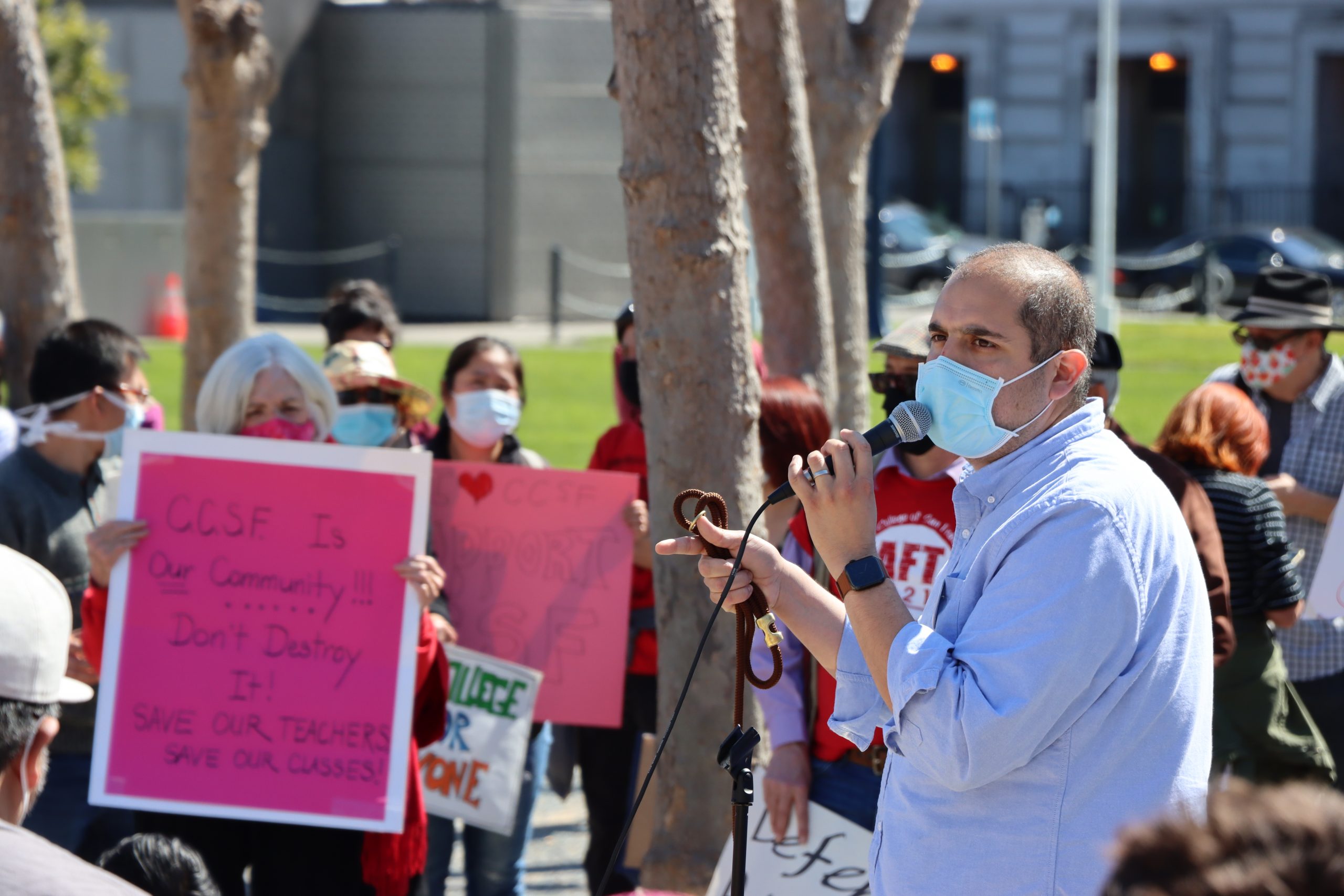
Many of those present at the March 12 CCSF demonstration either felt they were not close enough to the decision making process to know whether the recent layoff notices could have been a residual result of the now four-year-past state intervention, or did not want to go on record with their opinion.
Faculty present at the demonstration, including Keech, spoke about interactions they had had with members of the larger community. People seemed surprised, they said, that the college was still open for business. Keech credits negative publicity surrounding the state takeover for leaving the public with the impression that CCSF had either fully lost its accreditation or that it was on the verge of doing so.
“We lost students because there was bad press. We had the state takeover and we’ve never gotten back,” Keech said.
“I’ve been here long enough to remember a city college that functioned.”

Keech started at City College in 2001 and speaks with pride about what the ESL department has managed to do for the lives of people who come into the country and want a better life for themselves and their family. According to a March 10 article published by CCSF’s student publication The Guardsman, ESL received the largest number of layoff notices amongst all departments, at 19 notices total.
“In a time when we should be serving our marginalized populations, we’re gutting courses that better should be accessible to our students,” said Breana Hansen, LGBT studies professor and interdisciplinary studies faculty member. Hansen also received a pink slip and is one year shy of receiving tenure.
They expressed dismay over the decimation of faculty numbers, which could potentially leave LGBT courses being cut away and only one full-time faculty left to teach what remains.
“All our departments are seeing massive, massive cuts. It’s painful, it’s painful to get a letter that says, ‘You are no longer needed,’” they said. “All I do is work my ass off for this institution. I love my students, that’s why I do it. But the administration is so disconnected from the community.”

Protestors at Civic Center Plaza echoed that students will be the ones who suffer the most if the pink slips turn into layoffs, pointing out that many of the departments threatened with layoffs are the ones that act as primary access points for those who want an education. One of the pillars of CCSF’s mission statement is “to provide programs and services leading to Basic Skills, including learning English as a Second Language and Transitional Studies.”
Bo Hong, a tenured full-time construction technology faculty member, criticized administrators for what he sees as a pattern of mismanagement. “The current administration, they don’t even know how to deal with these kinds of problems,” said Hong. “They carry on. Year after year.”
Protestors’ main concerns revolved around what can be done to save programs from being discontinued and protect faculty members from losing their positions completely. Faculty, staff and community members at the demonstration were firm in their perspective: layoffs aren’t the answer.
A petition started by CCSF-HEAT (Higher Education Action Team) is being circulated online to put forward a vote of no confidence in the administration. This vote would act as a public reprimand of the top administrators at the college.
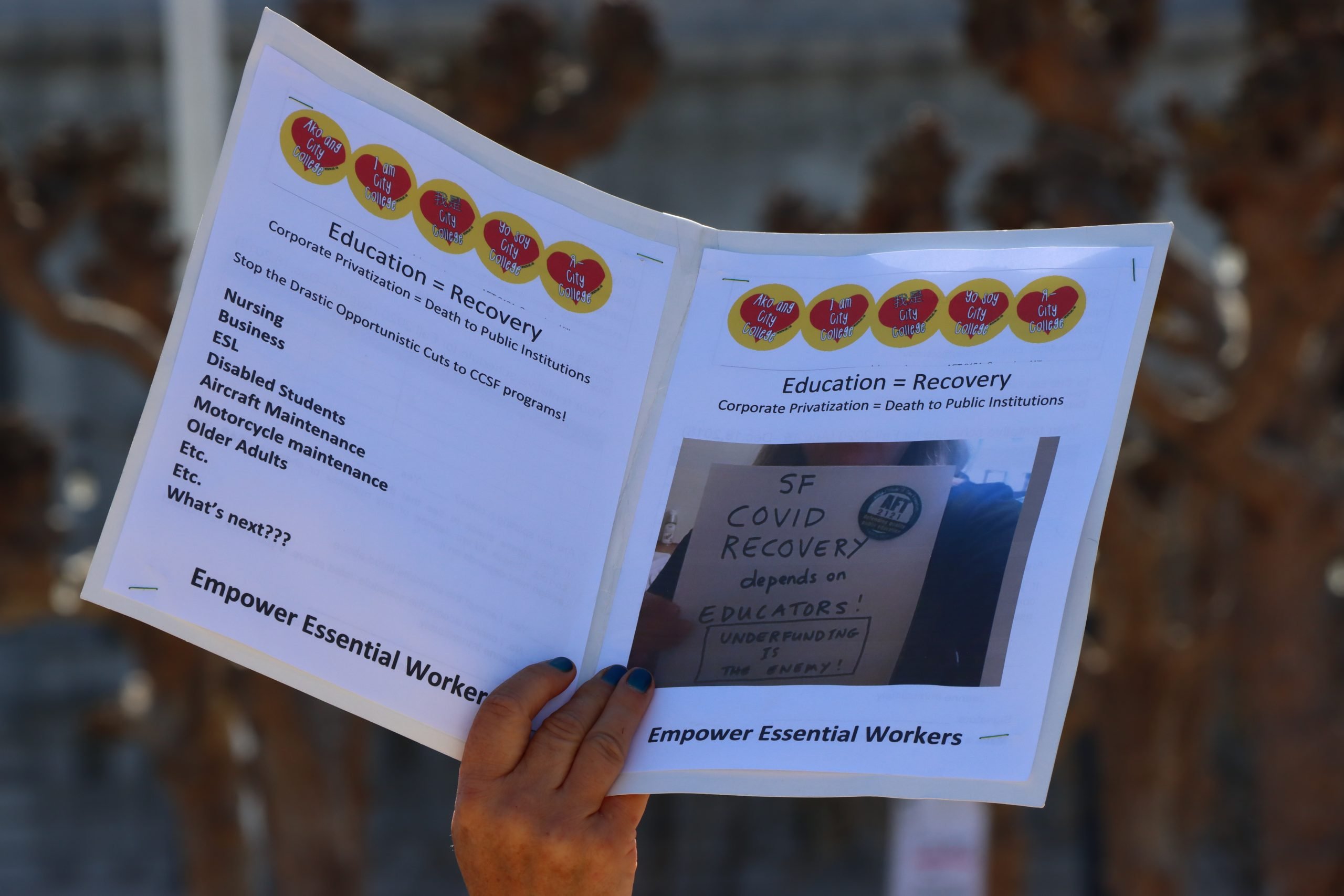
Peralta Federation of Teachers (PFT) Local 1603 President Jennifer Shanoski recently referred to such cuts as a “death spiral” approach, in which declining enrollment leads to faculty and program cuts, which gives way to lower enrollment and then even more cuts. The argument being that trustees and administrators must enact alternative plans to end such collective declines before they begin.
Shanoski spoke at the virtual “Defend Our City College” press conference, held at the same time as the in-person Civic Center demonstration. She expressed gratitude for the strong relationship that exists between PFT Local 1603 and American Federation of Teachers (AFT) Local 2121, the CCSF faculty union, saying that PFT is lucky “to have their input on how we can avoid a similar outcome and/or fight against it.”
PCCD recently hosted the Accrediting Commission for Junior and Community Colleges (ACJCC) for a week long virtual site visit in the first week of March.
During the ACJCC site visits, the four colleges either received recommendations unrelated to compliance, were told to continue with the programs they already had in place or were not given any recommendations at all.
The district office is not itself subject to accreditation; only the schools are. Several compliance recommendations were, however, directed at the district and board of trustees.
The ACJCC review voiced concerns over the district’s financial stability, the board of trustees’ “ability to make financial decisions,” as well as their ability to “delegate authority and make decisions independent of outside influence.”
Also listed as concerns was the district’s “internal controls and administrative capacity.”
The ACCJC did commend efforts made by the board in the “last few months” to turn things around, asserting that if they were to stay the course, concerns over aforementioned compliance issues would be resolved.
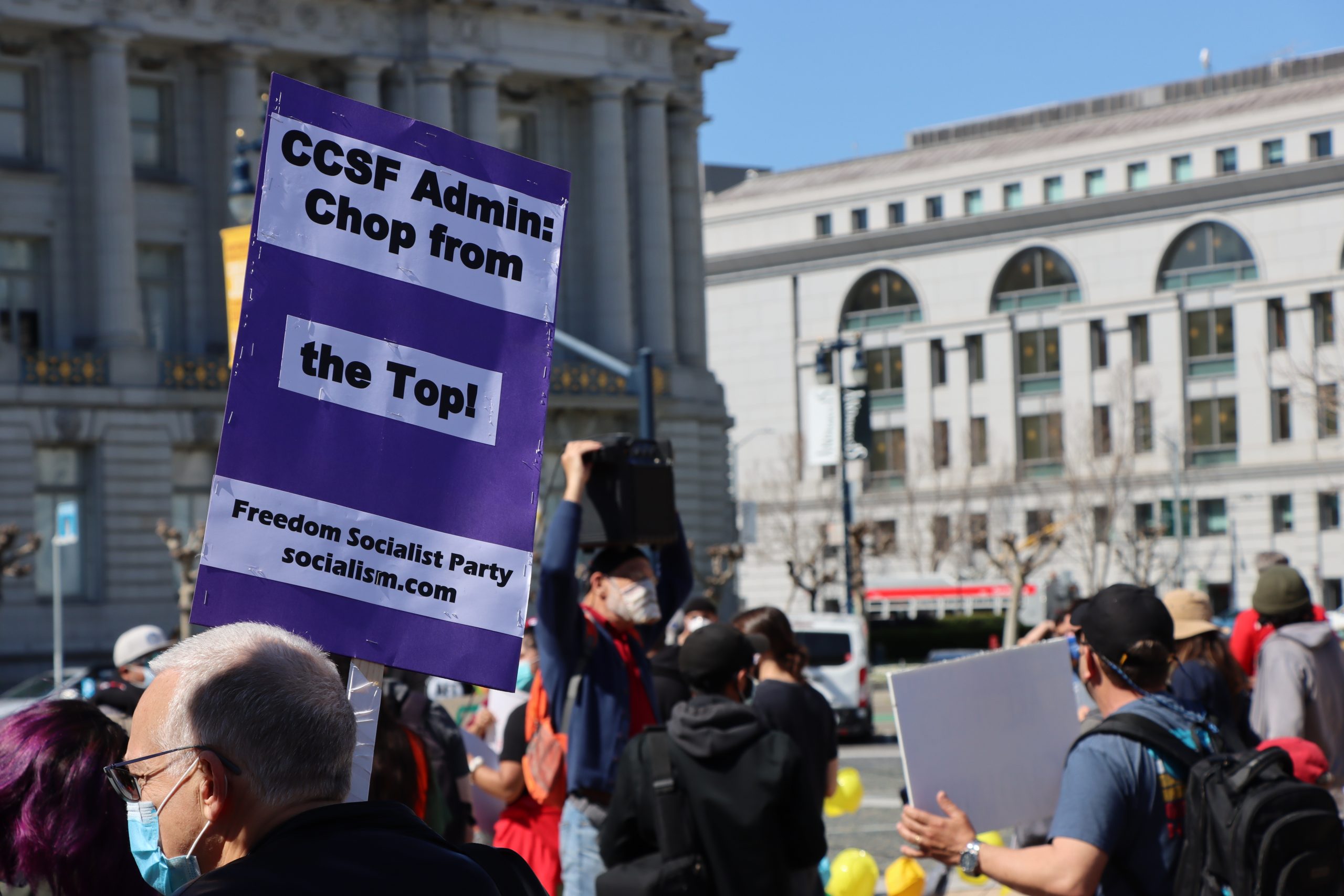
“The colleges and district don’t seem to have the same ‘presence’ in the East Bay that they used to have,” Chris Weidenbach, faculty accreditation coordinator (2019-2021) and faculty chair of the English department at Laney College, said in the developing wake of the site visits.
“We don’t have confidence that prospective students are being sufficiently reached out to and invited, reminded, encouraged to check out the EDU (higher ed) pathways available here.”
Following the site visits, PCCD administrators released a leadership statement specifying that the team leaders of the site visit will write up reports detailing their findings. The individual college presidents will then have 30 days to issue any “corrections of errors of fact” before the final report is sent to the main ACJCC body. This final report will be pivotal in the June 2021 accreditation decision.




